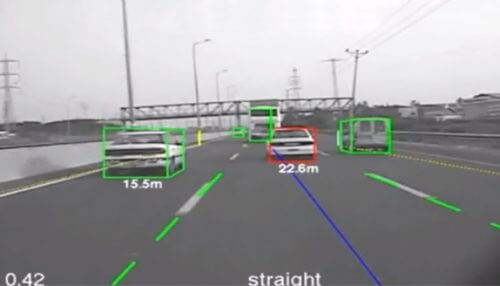Says Professor Arel Avinari, head of the Infrastructure Systems Engineering and Management Program at Afka College and an expert in communication between vehicles and between them and the infrastructures

"Israel has become a powerhouse in the field of vehicle development, despite the fact that there is not a single car manufacturer here." Says Professor Arel Avinari, head of the program for engineering and infrastructure systems management at Afka College and an expert on communication between vehicles and between them and the infrastructures in an interview with the website Havid in which he analyzes the consequences of the acquisition of Mobileye by Intel for a record sum of 15.3 billion dollars.
According to Prof. Avinari, "We are facing a transportation revolution based on connectivity. All vehicles will be able to talk to each other (V2V - Vehicle To Vehicle) and each vehicle will be able to provide basic details to vehicles in its vicinity - immediately, without the need for the cloud or any intermediary, not even a smartphone. This raises many questions of cyber and information security, and is currently in place in the main countries that produce cars - the United States, Japan and European countries. In addition, we are also preparing for standardization for connectivity between vehicles and infrastructure, such as traffic lights, billboards, etc... (V2I - Vehicle To Infrastructure)".
He explained that - "This was born out of a safety need. A large part of the traffic accidents could have been avoided if the drivers had known about the threat approaching them, which are not in their field of vision. This information is currently not in the hands of drivers due to the lack of line of sight, but even if the driver can see - he does not always react in time."
What does the transaction mean for the development of the autonomous vehicle sector?
The importance of Mobileye's developments is enormous. The whole sensor issue is an essential function for an automated vehicle. It needs sensors to get to know the environment and understand the safety hazards as well as identify other users in real time and process a very large amount of information in a short time. That's what Mobilay is doing right now. Of course, the issue of safety is extremely important, but it is not the only one.
"It is quite clear to me that the development of the autonomous vehicle will be based on systems of more than one technology, some are talking about the Internet communication of the next generation (the fifth generation) as a means of communication between vehicles and between them and the infrastructure: traffic signs, traffic lights, road users. In order for a vehicle to be autonomous, it must have very good connectivity in real time. There is more than one technology that is used for this purpose and the technologies that Mobileye uses are complementary technologies but not exclusive."

What is still missing?
"If I understand correctly, it is currently limited to communication that relies on optics, meaning what is in the vehicle's line of sight. This requires extensions of processing information that also comes in other ways, for example there should be connectivity between vehicles even if there is no line of sight between them. For example a T-junction or topography or poor visibility conditions there is a chance that the system will miss them. By itself, it is still not the solution, but it can be a complementary solution for an autonomous vehicle. It's not PLUG AND PLAY - you put in such a system and the vehicle becomes autonomous, but it is a complementary function/supports the vehicle's ability to react intelligently and quickly to the environmental and road conditions."
What does Intel get out of the deal?
In the end, Intel's main activity is to sell processors, anything that has a processor in it, including chips they are interested in. For a long time it is not just about computers, there is the Internet of Things when many devices that are not computers are equipped with chips. It is only natural that Intel would be interested in cars because the car market is huge and there is huge potential. If there are Intel chips in the cars and especially if they somehow manage to enter as a standard of the car systems, there is no doubt that there is a huge sales potential here. Maybe in the future they will develop not only car chips but also for communication between vehicles and infrastructure systems of smart cities that communicate with the cars. They too will be based on computer components and this is a market that Intel will not want to miss.
Is the Israeli academy prepared to produce engineers in the automotive field, andThere are already 450 startups in the automotive field in Israel?
"Israel has become a powerhouse in the field of vehicle development, despite the fact that there is not a single car manufacturer here, which is an unusual phenomenon. In contrast, Israel itself is itself even without Mobileye. There is a huge amount of companies that develop unique hardware and software solutions for vehicles. There is potential.”
"I know that there are many activities in the academy in the automotive field. At Afka College, we opened a unique track of vehicle development in the mechanical engineering department that attracts a lot of students. A new generation of more integrative engineers is growing up. Not only classic mechanical engineers or classic electrical engineers and look at a certain aspect of the vehicle systems. In Israel there is more potential than in other countries to promote the more interdisciplinary and systemic approach to vehicles and transportation, and it is no coincidence that there are quite a few Israeli companies that develop systems for cars."
"Technology will make it possible to reduce traffic accidents by ninety percent"

One response
In all the revelry and joy they forgot that in Israel there is still a person killed in a car accident every day.
360 days a year and 360 deaths a year.
More dead than all the wars, and all the terrorist attacks and events.
And despite all these deaths, there is no proportion between the state's investments in security compared to the investments in preventing road accidents, which is actually the highest security risk to the life of the average citizen in the country.
There is also no proportion to the occupation of the media, governments, ministers, committees... on the issue of terrorism and military security and the issue of preventing road accidents.